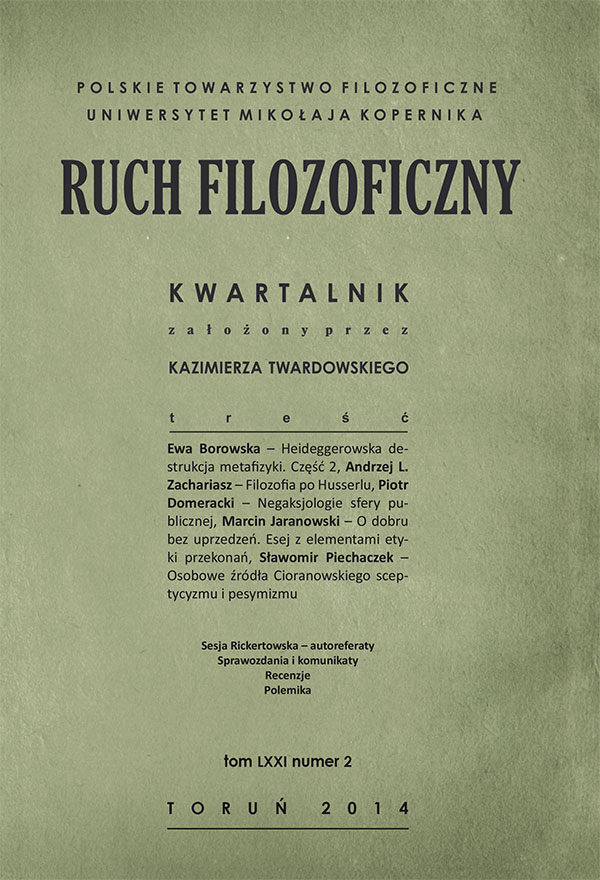Two projects of methodological antinaturalism follow the lead of Heinrich Rickert’s and Ernst Cassirer’s philosophy
DOI:
https://doi.org/10.12775/RF.2014.020Keywords
Neo-Kantianism, Cassirer, Rickert, methodological antinaturalism, philosophy of cultureAbstract
Two philosophers of turn of the century, Heinrich Rickert (1863–1936) and Ernst Cassirer (1874–1945) belong to large and not identical in meaning in their own views, the Neo-Kantianism movement. Though the Immanuel Kant’s philosophy to the state for both the irrefutable base – the foundation of considerations, among the theory of author of three Critiques and neo-Kantianism comes to light the difference of the range as far as Kant’s transcendentalism has the general character, insomuch aground Southwestern neo-Kantianism whose a representative is Rickert, takes place his particularization. There placing the problem of a priori conditions of possibility of the recognition, Rickert undertakes an attempt of the transcendental basis of the culture. Seeking bases of the recognition and the culture whatever, accepts Windelband’s partition of know-
ledge on generalizing nomothetic’s disciplines (the sciences) and individualizing idiographic’s disciplines (the humanities) and calls the history a condition of the possibility of the experience. As the representative of the methodological dualism this thinker makes the philosophy, with the critical theory of cultural values. To include into the range of methodological decisions of the axiological problem among which to the foreground advances the problem granting the life the sense of the value and this, what necessarily important, Rickert not only additionally qualifies across this the proper object of the recognition, but also the theoretical thinking implants in the duty, instead the recognition establishes in the pure logic of being obligatory (Geltung).
The problem of logical bases of disciplines about the spirit, examined from the perspective of the critical philosophy of the culture, investigates also the schoolboy of the Marburg neo-Kantianism, Ernst Cassirer. Its own interests with sciences, especially with the mathematical physics, he enriches with the widely understood idea of the culture founding, that sciences about the nature and the humanities as decisive about the all activity of the man, are not to themselves opposed, but mutually are complementary to one another. Binding measurable-quantitative and volitional and emotional – the qualitative moment of the act of the recognition, Cassirer throws up proposed by Baden school (Windelband, Rickert) of the theory of the value and the partition disciplines of knowledge. Perceiving the human variability, one assembles on historic and humanistic description of various forms of the human life.
Showing the primary relationship of the Cassirer’s and Rickert’s thought with theoretical either with the practical Kant’s knowledge, in the pronouncement I return the special attention on the course of the line of demarcation dividing the sphere Geisteswissenschaften from the area Naturwissenschaften in proposed by neo-Kantian programs of the philosophy. Using the method of the comparative analysis, I characterize the manner of the seizure of the sciences and humanities – knowledge about the culture in Rickert’s philosophy expresses himself in the difference: nasci – colere, instead inwards Cassirera accepts the form of the disjunction: fact of the science – fact of the culture; difference which comes to light among this, what quantitative and to these, what qualitative.
References
Andrzejewski B., Animal symbolicum. Ewolucja neokantyzmu Ernsta Cassirera, Wydawnictwo Naukowe Uniwersytetu Adama Mickiewicza, Poznań 1980.
Buczyńska H., Cassirer, Wiedza Powszechna, Warszawa 1963.
Cassirer E., Das Erkenntnisproblem in der Philosophie und Wissenschaft der Neueren Zeit, bd. 2–5, Felix Meiner Verlag, Hamburg–Berlin 2002.
Cassirer E., Logika nauk o kulturze, przeł. P. Parszutowicz, Wydawnictwo Antyk, Kęty 2011.
Dąmbska I., Kilka uwag w sprawie wartości poznawczych, „Znak” 1965, nr 4, s. 439–445.
Holzamer J.K., Der Begriff des Sinnes, entwickelt im Anschluβ an das „irreale Sinngebilde” bei Heinrich Rickert, „Philosophisches Jahrbuch” 1930.
Konersmann R., Filozofia kultury. Wprowadzenie, Oficyna Naukowa Warszawa, Warszawa 2009.
Kubalica T., Prymat rozumu praktycznego w logice. Teoria prawdy neokantowskiej szkoły badeńskiej, Wydawnictwo Uniwersytetu Śląskiego, Katowice 2009.
Musioł A., Idea physis i anthropos w antynaturalizmie metodologicznym Ernsta Cassirera, w: Filozofia a nauki przyrodnicze. Od physis do metaphysis i anthropos, red. M. Woźniczka, A. Marek-Bieniasz, Oficyna Drukarska Jacek Chmielewski, Częstochowa 2012.
Noras A.J., Historia neokantyzmu, Wydawnictwo Uniwersytetu Śląskiego, Katowice 2012.
Neokantyzm, przeł. B. Borowicz-Sierocka i C. Karkowski, Wydawnictwo Uniwersytetu Wrocławskiego, Wrocław 1984.
Orth E.W., Ernst Cassirer zwischen Kulturphilosophie und Kulturwissenschaften. Ein Terminologisches Problem?, w: Lebendinge Form. Zur Metaphysik des Symbolischen in Ernst Cassirers „Nachgelassenen Manuskripten und Texten”, hrsg. R.L. Fetz, S. Ullrich, Felix Meiner Verlag, Hamburg 2008.
Przyłębski A., W poszukiwaniu królestwa filozofii. Z dziejów neokantyzmu badeńskiego, Poznań 1993.
Rickert H., Die Grenzen naturwissenschaftlichen Begriffsbildung. Eine logische Einleitung in die historischen Wissenschaften, Freiburg–Leipzig 1896.
Rickert H., Kant als Philosoph der modernen Kultur. Ein geschichtsphilosophischer Versuch, J.C.B. Mohr, Tübingen 1924.
Rickert H., Kulturwissenschaft und Naturwissenschaft, J.C.B. Mohr, Tübingen 1915.
Rickert H., Tezy do systemu filozofii, przeł. B. Borowicz-Sierocka, w: Neokantyzm, przeł. B. Borowicz-Sierocka, C. Karkowski. Wydawnictwo Uniwersytetu Wrocławskiego, Wrocław 1984.
Słownik filozofii, red. A. Aduszkiewicz, Świat Książki, Warszawa 2004.
Sójka J., O koncepcji form symbolicznych Ernsta Cassirera, Państwowe Wydawnictwo Naukowe, Warszawa 1988.
Downloads
Published
How to Cite
Issue
Section
Stats
Number of views and downloads: 866
Number of citations: 0



